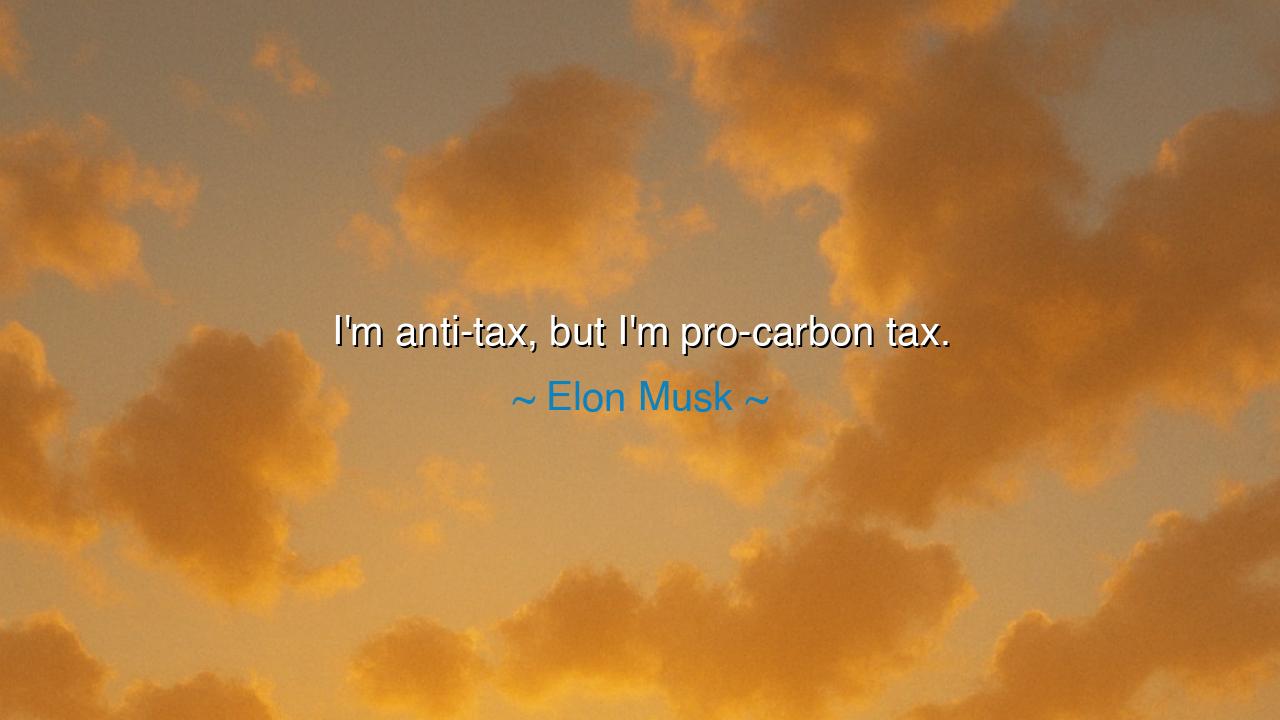
I'm anti-tax, but I'm pro-carbon tax.






“I’m anti-tax, but I’m pro-carbon tax.” Thus spoke Elon Musk, a man whose vision stretches from the molten core of the Earth to the cold reaches of Mars. In this brief yet weighty statement lies a paradox—and within that paradox, a profound truth about the balance between freedom and responsibility, between prosperity and planet. Musk, who champions innovation and the boundless creativity of the human spirit, resists the heavy hand of taxation that so often stifles enterprise. Yet he bows, in wisdom, to the necessity of one tax—the carbon tax—not as a burden, but as a moral correction, a reckoning for the invisible debts we owe to the Earth itself.
To understand these words, one must look not with the eyes of a merchant, but with the eyes of a philosopher. For Musk’s paradox is no contradiction at all, but a lesson in justice. He opposes taxes that punish creation, that drain the energy of progress without purpose. But he supports the carbon tax, for it holds a higher aim: to align human ambition with the laws of nature, to make the cost of destruction visible to those who profit from it. It is not a toll upon success, but a mirror held up to our consumption. Where the careless have treated the atmosphere as a waste bin for carbon, this tax is the weight that restores balance to the scale.
The ancients knew that every act of taking must be followed by an act of giving. When a farmer cut trees for his field, he replanted. When a tribe hunted the deer, they thanked the spirit of the forest. But in this age of engines and smokestacks, humanity has taken and taken without remembrance. The Earth, generous beyond measure, has begun to show her fatigue—her glaciers weeping, her winds turning wild, her oceans rising in silent protest. Musk’s words are thus not political, but spiritual: a recognition that the carbon tax is a way to make visible the sacred duty we have long ignored.
Consider the example of Sweden, a land of snow and wisdom, which in the year 1991 dared to impose one of the world’s first carbon taxes. Many feared ruin; they said it would break the back of the economy. But instead, innovation bloomed. Emissions fell while prosperity rose. The tax did not strangle their industry—it refined it. It became the hammer that tempered greed into progress, showing that a civilization could grow and yet give back. This is the truth Musk understood: that greatness does not lie in unchecked freedom, but in disciplined stewardship.
To be anti-tax is to believe in the sovereignty of creation—that men and women should build freely, without the chains of bureaucracy. But to be pro-carbon tax is to accept that freedom must carry weight; that when our prosperity endangers the very foundation of life, it ceases to be freedom at all. The carbon tax, then, is not a punishment—it is a compass, guiding innovation toward harmony with the planet that birthed it. It rewards wisdom over waste, vision over vanity. It calls upon the strong not merely to achieve, but to atone.
In this way, Musk’s quote transcends economics; it becomes a moral law. It teaches that not all restraint is tyranny, and not all cost is loss. Sometimes, the price we pay today is the seed of tomorrow’s salvation. Just as the builder must sacrifice the stone to raise a temple, so must humanity sacrifice its indulgence to raise a sustainable world. The carbon tax is not the end of progress—it is the forge through which progress becomes just.
Let those who hear this teaching take it to heart. You who breathe the air, who travel the roads, who kindle the fire of modern life—remember that every breath, every light, every movement bears a cost. If you cannot pay that cost in restraint, then pay it in renewal. Support the planting of trees, the birth of clean technologies, the return of balance between mankind and the Earth. Do not see the carbon tax as a burden, but as a covenant—a promise that we will no longer live at the expense of our children’s future.
Thus, the wisdom of Elon Musk, spoken in the language of paradox, becomes clear. Be anti-tax when it enslaves the spirit—but be pro-carbon tax when it redeems the Earth. For in the end, civilization will not be measured by what it consumes, but by what it restores. And those who choose love for the planet over the comfort of convenience will stand among the true architects of the future—the builders not only of worlds, but of wisdom.






AAdministratorAdministrator
Welcome, honored guests. Please leave a comment, we will respond soon